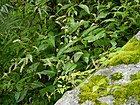Note: This is a project under development. The articles on this wiki are just being initiated and broadly incomplete. You can Help creating new pages.
Achyranthes bidentata- Kaadu Uttharaani
Achyranthes bidentata is a perennial plant growing 70 - 120cm tall. The plant is often harvested from the wild. It is widely cultivated in China, especially in Henan Province, as a medicinal plant and as a food plant.
Contents
[hide]- 1 Uses
- 2 Parts Used
- 3 Chemical Composition
- 4 Common names
- 5 Properties
- 6 Habit
- 7 Identification
- 8 List of Ayurvedic medicine in which the herb is used
- 9 Where to get the saplings
- 10 Mode of Propagation
- 11 How to plant/cultivate
- 12 Commonly seen growing in areas
- 13 Photo Gallery
- 14 References
- 15 External Links
Uses
Inflammation, Piles, Urinary problems, Menstrual problems, Whooping cough [1]
Parts Used
Chemical Composition
A water-soluble oligosaccharide, composed of six glucose units and three mannose units, has been isolated from the roots The roots contain free oleanolic acid (0.096%) and its saponins (1.93%). An alcoholic extract of the root showed presence of amino acids, steroids, triterpenoids, alkaloids and coumarins. The seeds afforded achyranthin. [2]
Common names
| Language | Common name |
|---|---|
| Kannada | Kaadu uttharaani |
| Hindi | Putkanda |
| Malayalam | |
| Tamil | Naayurivi |
| Telugu | |
| Marathi | |
| Gujarathi | |
| Punjabi | |
| Kashmiri | |
| Sanskrit | Shveta apamarga |
| English |
Properties
Reference: Dravya - Substance, Rasa - Taste, Guna - Qualities, Veerya - Potency, Vipaka - Post-digesion effect, Karma - Pharmacological activity, Prabhava - Therepeutics.
Dravya
Rasa
Guna
Veerya
Vipaka
Karma
Prabhava
Habit
Identification
Leaf
| Kind | Shape | Feature |
|---|---|---|
| Simple | Opposite | 10-16 x 2-2.5 cm, linear-lanceolate, apex acuminate, thinly pubescent; nerves 7-9 pairs; petiole 5 mm long. |
Flower
| Type | Size | Color and composition | Stamen | More information |
|---|---|---|---|---|
| Bisexual | Axillary and terminal | Spike axillary and terminal, 15-30 cm long, narrow, glabrous; bracts 4 x 1.5 mm, lanceolate, long-aristate; bracteoles 3 mm long, entire, aristate. Flowers distant; tepals equal, 7 x 1.5 mm, lanceolate, acuminate, glabrous. |
Fruit
| Type | Size | Mass | Appearance | Seeds | More information |
|---|---|---|---|---|---|
| Achenes | 3 x 1.5 mm | cylindrical, longitudinally striate, reddish-brown. |
Other features
List of Ayurvedic medicine in which the herb is used
Where to get the saplings
Mode of Propagation
How to plant/cultivate
Commonly seen growing in areas
Evergreen forest, Tropical area, Sub tropical area, Himalayas
Photo Gallery
References
- Jump up ↑ Uses
- Jump up ↑ Chemistry
- Jump up ↑ Common names
- Jump up ↑ Morphology
- Jump up ↑ [Cultivation]
External Links
- Ayurvedic Herbs known to be helpful to treat Inflammation
- Ayurvedic Herbs known to be helpful to treat Piles
- Ayurvedic Herbs known to be helpful to treat Urinary problems
- Ayurvedic Herbs known to be helpful to treat Menstrual problems
- Ayurvedic Herbs known to be helpful to treat Whooping cough
- Herbs with Leaves used in medicine
- Herbs with Root used in medicine
- Herbs with Seeds used in medicine
- Herbs with common name in Kannada
- Herbs with common name in Hindi
- Herbs with common name in Tamil
- Herbs with common name in Sanskrit
- Habit - Shrub
- Index of Plants which can be propagated by Seeds
- Index of Plants which can be propagated by Cuttings
- Herbs that are commonly seen in the region of Evergreen forest
- Herbs that are commonly seen in the region of Tropical area
- Herbs that are commonly seen in the region of Sub tropical area
- Herbs that are commonly seen in the region of Himalayas
- Herbs
- Acanthaceae



